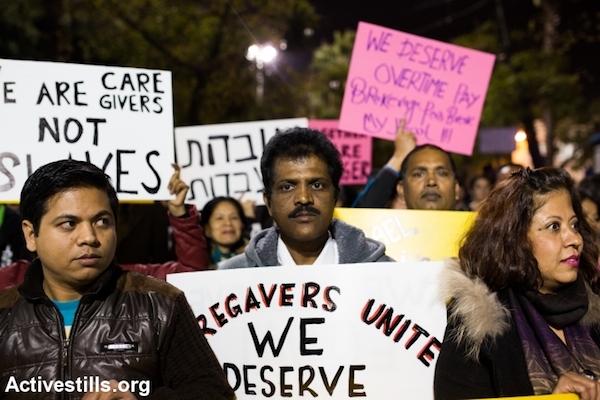On paper Israel’s for-profit manpower agencies act as job providers for impoverished groups from third world countries. In reality, they are the drivers of a system that harms workers, employers, and the state.
By Abigail F. Kolker

In Israel, there are some 60,000 migrant caregivers, comprising the largest group of documented migrant workers in the country. These workers provide individualized, home-based care for the elderly and severely disabled. The vast majority (over 80 percent) of these workers are women, mostly hailing from the Philippines, Nepal, Sri Lanka, India, and Moldova.
The recruitment and monitoring of migrant caregivers is controlled by private, for-profit manpower agencies. These agencies are responsible for recruiting qualified workers from abroad and matching them with a compatible employer. Most importantly, they are required to monitor the employment situation to make sure the workers’ rights are being upheld and that the employers are receiving quality care.
Unfortunately, because agencies are privatized, these important matching and monitoring duties are secondary to their main objective: profit. While agencies do charge employers nominal fees, their main source of income comes from the illegal recruitment fees they collect from workers abroad. Migrant caregivers pay between $5,000-$13,000 for a work visa; the average amount is continually rising, with no sign of slowing down. Interestingly, standard fees vary by country of origin, with South Asian migrants paying the most. These fees corrupt the entire caregiving industry, for importing new workers becomes an ends rather than a means for manpower agencies. This leads agencies to skimp on their aforementioned monitoring responsibilities and creates a whole host of problems for the worker, the employer, and the state.
The perverse financial incentives of private manpower agencies are detrimental to the workers. The agencies’ inadequate concern with their duty to monitor labor standards infringes upon workers’ rights and can result in devastating situations in which verbal, physical, or sexual abuse goes unreported. Even when violations are acknowledged, monetary incentives distort agencies’ obligation to be neutral mediators of conflict. As the employer is their main client and workers can be replaced easily, agencies sometimes tell caregivers to have “patience” in the face of minor abuses, delayed payments, or denial of social benefits.
Brokerage fees limit workers’ freedom of choice of employment and increase their susceptibility to abuse, exploitation, and irregular status. The debt incurred by these fees can take years to pay off, during which time workers are may be unwilling to risk secure employment, often remaining in unsafe or unfair working situations. What’s more, these fees elongate the period of time migrants must work in Israel to make their migration worthwhile. This can incentivize migrants to overstay their visa, and the resulting undocumented status increases their vulnerability.
Financial incentives created by illegal mediation fees also negatively affect the quality of care for the elderly and disabled. During initial recruitment, agencies likely allocate visas based on economic interests rather than qualifications. Only workers who can afford the fee are even considered, and pre-screening for language skills and professional qualifications appears to be superficial or non-existent. On a wider scale, agencies have increasingly recruited from countries in which they are able to extract higher recruitment fees, despite the fact that those workers have lower levels of education, weaker or no English skills, and less familiarity with Western medicine.
Clearly, the best interests of the employers are not a priority in the recruitment process. But that’s not all; the agencies actively encourage patients to hire a newly imported worker, depicting caregivers already in Israel as “washed-out.” This is unfortunate because patients would most likely receive a higher caliber of care from someone already familiar with the country, with this type of work and the Hebrew language.
![Israeli authorities arrest a migrant worker and her small child [file]. (Photo by Oren Ziv/Activestills.org) Israeli authorities arrest a migrant worker and her small child [file]. (Photo by Oren Ziv/Activestills.org)](https://static.972mag.com/dev/uploads/2014/10/migrant-arrest.jpg)
Despite being responsible for the creation of this privatized industry, the Israeli state also suffers the consequences of for-profit manpower agencies. Although clearly many of its policies contradict this goal, as a Jewish state, Israel wants to keep the number of migrant workers to a minimum. Nevertheless, for-profit manpower agencies artificially inflate the size of this industry. They increase demand by convincing eligible elderly to apply for permits to hire a migrant caregiver, and their promotion of newly-imported workers has created a “revolving door” phenomenon that increases the size of the undocumented population. The state (read: the Israeli taxpayers) must bear the extra expenses resulting from the ballooning population of both documented and undocumented migrant caregivers.
The privatization of migrant worker recruitment and management in the caregiving field has harmful consequences for the workers, the elderly patients, and the State of Israel. In order to ensure more positive outcomes, the state must change the structure of migrant labor recruitment and oversight.
In 2012, Israel signed bilateral agreements with countries of origin to improve recruitment and regulation in the fields of agriculture and construction. Caregiving, the largest sector that employs migrant workers, desperately needs a similar solution. A bilateral agreement will not be a cure-all, but it has the potential to eliminate illegal brokerage fees.
Without the interference of this “black money,” Israel would be better able to protect workers’ rights, safeguard against abuse, ensure a high caliber of care, make quality matches, and contain the size of the industry. Until then, migrant caregiver recruitment and management will continue to be sabotaged by easily corruptible for-profit manpower agencies. In this privatized system everyone — the worker, the employer, and the state — loses.
The author is a PhD candidate in Sociology at the City University of New York Graduate Center. She is currently a Shatil Fellow at Kav LaOved. Kav LaOved, along with NGOs from dozens of different countries, is currently participating in the #OurHands campaign, which aims to educate migrant caregivers and other domestic workers about their rights.

